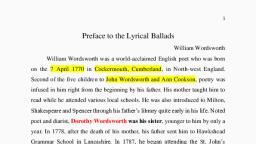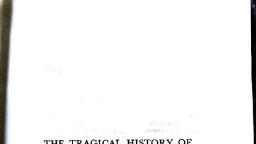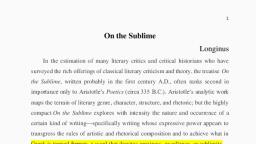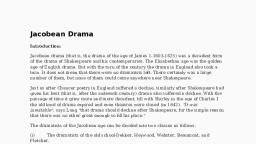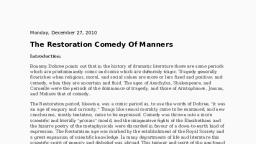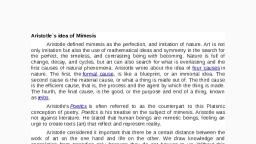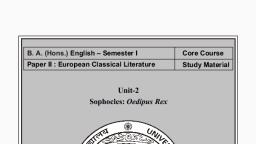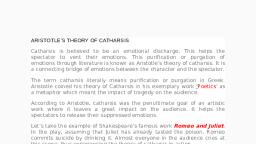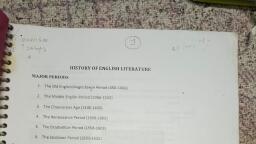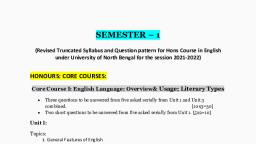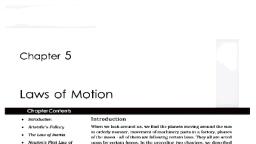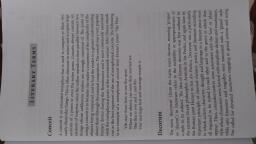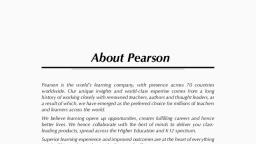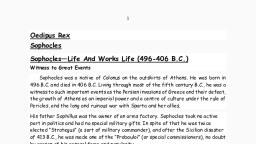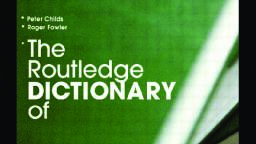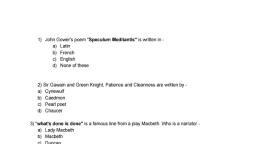Page 1 :
1, , Poetics, Aristotle, Definition of Tragedy, “Tragedy, then, is an imitation (copy / representation / recreation) of an, action that is serious, complete, and of a certain magnitude (greatness); in, language embellished (decorated) with each kind of artistic ornament, the, several kinds being found in separate parts of the play; in the form of action, (trained actors, stage and other things), not of narrative (no story telling); with, incidents (happenings) arousing pity and fear, wherewith to accomplish its, katharsis (catharsis/ Purgation/ Purification) of such emotions., 1., 2., 3., 4., 5., 6., 7., 8., , an imitation of an action, that is 1. serious, 2. complete, and of a certain magnitude;, in language embellished, kinds being found in separate parts;, in the form of action,, not of narrative;, arousing pity and fear,, katharsis of such emotions, , AN INTRODUCTION TO ARISTOTLE’S POETICS, ‘Aristotle bestrode antiquity like an intellectual colossus. No, man before him had contributed as much to learning. No man after him, could hope to rival his achievement.’ -J. S. Barnes, From the point of view of dramatic theory, Aristotle’s Poetics consists of, four distinct elements –, ✓ The concept of Mimesis, ✓ Different Genres – epic, tragedy and comedy
Page 2 :
2, , ✓ The division of tragedy into six elements – plot (mythos), character, (ethos), thought (dianoia), language (lexis), music (melopolia) and, spectacle (opsis), ✓ Catharsis,, Before beginning the discussion of these essential attributes of Aristotle’s, Poetics, let us have a brief conceptual clarity of the chapterization of Aristotle’s, Poetics, with the broad themes that are dealt in these 26 chapters –, 1. Art in general as imitation and how different forms of art differ in means of, imitation, 2. Difference in Object of Imitation, 3. Difference in manner of imitation, 4. Lyrical poetry and tragedy, 5. Comedy and Epic poetry, 6. Tragedy and its parts, 7. Plot – Beginning, middle and end; Magnitude and Organic wholeness of, plot, 8. Unity of Subject, 9. Poetry is imitation of what ought to be, 10. Simple and Complex Plots, 11. Elements of Complex Plot – Peripety, Discovery and Suffering, 12. Divisions of Tragedy, 13. The Protagonist or the Tragic Hero – his Misfortune and Change of Fortune, 14. Effect of Tragedy – Catharsis – Purgation of the feelings of Pity and Fear, 15. Character – requirement: Good, Consistent, Life like., 16. Discovery, 17. Construction of Plot and Diction, 18. Complication and Denouement
Page 3 :
3, , 19. Diction and Thought -- Rhetoric, 20. Diction – Parts of Speech, 21. Diction – Metaphor, 22. Qualities of Diction – Clarity, Distinction etc., 23. Epic – what is common with tragedy; Superiority of Homer, 24. Epic – same divisions as Tragedy, 25. Nature of Representation of Reality and Evaluation of the Poetic art, 26. Comparison of Epic and Tragedy., , The Concept of Mimesis, Poetics opens with Aristotle’s views on mimesis (literal translation, Imitation), where he differs much from his teacher Plato, who regarded art to be, ‘thrice removed from reality’ and can be in no way a valid means to attain, knowledge. For Plato, art merely waters the emotional selves, therefore he, thought that the poets should be banished from the society, as they write under, some kind of ‘divine madness’ and know not what they are talking about in their, creative output., Where Plato thought that the poets are of no use to the societal good,, Aristotle regarded them very highly, as the poets as per him in their imitation of, the reality do not denigrating reality, but are trying to incorporate the universal, aspect. Poetry from Aristotelian point of view is not about ‘what was’ or, ‘what is’ but about ‘what ought to be’. In that sense, for Aristotle, poetry or art, aspires to capture that aspect of nature in its imitation which is idealistic, a better, version than what exists in this world., Thus, imitation or mimesis is not demeaning, as it only through imitation, that human beings learn; and moreover, human beings love to imitate – as, Aristotle states in Poetics – Poetry in general seems to have sprung from two, causes, each of them lying deep in our nature. First, the instinct of imitation is
Page 4 :
4, , implanted in man from childhood, one difference between him and other animals, being that he is the most imitative of living creatures, and through imitation learns, his earliest lessons; and no less universal is the pleasure felt in things imitated., The reason why men enjoy seeing a likeness is, that in contemplating it they find, themselves learning and saying perhaps, ‘Ah, that is he.’ For if you happen not, to have seen the original, the pleasure will be due not to the imitation as such, but, to the execution, the coloring, or some such other cause. Imitation, then, is one, instinct of our nature. Therefore, if imitation is an innate fact of nature, then, the poets are not liars, (Plato claimed poets to be liars as they have no knowledge, of what they write about). Moreover, poets’ works point to Truth. Thus, Aristotle, upheld art and celebrated it (as against Plato) by pointing out that ‘Art imitates, nature and at the same time presents the ideal. (‘The artist may imitate, things as they ‘ought to be’.’ (Poetics 1)), Different Genres – Epic, Tragedy and Comedy, Aristotle begins his Poetics by straightaway stating that different art forms, are only different modes of imitation, and they differ from each other in almost, three parameters: means (i.e., language, for literature), objects (actions with, agents) and manner (i.e., dramatic or narrative). It is often thought that Aristotle’s, Poetics, as a text available to us, is not complete. There may be chapters on, Comedy and Satire which are missing. Assuming the kind of thoroughness that, Aristotle has in his writing, it is impossible to think that he merely talked about, Tragedy in Poetics and left other genres of drama untouched., When, comparing tragedy and comedy, Aristotle says that tragedy is, inclined to imitate people above the level of our world, comedy does imitate, people below our level. He further compares tragedy with epic and sees Tragedy, to be a much better form of art than the epic. Tragedy is for common audience, who feels restless for gross desires, while epic poetry is addressed to an educated, and enlightened audience – the epic ‘addresses a cultivated audience, which does, not need the accompaniment of gesture.’
Page 5 :
5, , Yet Aristotle points out tragedy to be superior to epic for the following, reasons –, a) Aristotle says that performance does not censure the tragic poet. If a, tragedy can be spoiled in performance, similarly an epic can also be spoiled in its, recitation. Tragedy like epic does not depend on performance for its full effect., b) Tragedy has all the elements of epic. Furthermore, it has two more, elements–a greater economy and concentration of effect., c) The tragic poet requires less space for the attainment of its end., Therefore, tragedy has greater economy as well as a more concentrated effect., TRAGEDY – THE SIX ELEMENTS, Ancient Greek theatre was religious in nature, as plays were usually, performed during religious festivals when the Greeks used to communicate with, Gods and ancestors. During the worshipping of gods and ancestors, intense, emotions were evoked which is the basis of the aesthetic value of catharsis in, Greek tragedy. Even music and dance are retained in the Greek theatre as major, activities., In Poetics, Aristotle points out that there are six essential elements in a, tragedy –, 1., 2., 3., 4., 5., 6., , Plot (mythos),, Character (ethos),, Thought (dianoia),, Language (lexis),, Music (melopoiea) and, Spectacle (opsis)., , These six elements of tragedy are inseparable as they together form an organic, whole, but for the sake of better understanding of the nature of tragedy, Aristotle, divided the six elements in two groups –, Internal – that is, subjective – Plot, Character and Thought ·
Page 6 :
6, , External – Diction (Language), Music and Spectacle, I. Plot (Mythos) - Myth or mythos, in Greek simply meant story, is, described by Aristotle as ‘the soul of tragedy’ (though Aristotle points out that, the other elements are not less essential). The myth is the most significant as it, binds together the other elements of the tragedy. The aim of a tragedy, according, to Aristotle, is to present the journey of the protagonist from one state of being, to another, through a series of episodes, focusing on an action. Plot should be an, organic whole, having magnitude – ‘Tragedy is an imitation of an action, , that is complete, and whole, and of a certain magnitude; for there may, be a whole that is wanting in magnitude. A whole is that which has a beginning,, a middle, and an end. A beginning is that which does not itself follow anything, by causal necessity, but after which something naturally is. An end, on the, contrary, is that which itself naturally follows some other thing, either by, necessity, or as a rule, but has nothing following it. A middle is that which, follows something as some other thing follows it., A well-constructed plot, therefore, must neither begin nor end at, haphazard, but conform to these principles.’ (Poetics, Chapter VII, 15) Thus,, without a proper beginning, a middle and an end, Tragedy would not achieve the, desired effect on the audience. Moreover, tragedy should imitate action that has, certain magnitude as it is the magnitude of the action that provides beauty to the, artistic rendition of the action – ‘a beautiful object, whether it be a living organism, or any whole composed of parts, must not only have an orderly arrangement of, parts, but must also be of a certain magnitude; for beauty depends on magnitude, and order.’ (Poetics, Chapter VII, 15) Action having magnitude, if presented with, wholeness (in the sense of completeness – having a beginning, a middle, and an, end) would provide unity of action to the plot, which according to Aristotle,, is a must for a tragedy. According to Aristotle, there are two kinds of plots –, Simple (aploi)
Page 7 :
7, , Complex (peplegmenoi), Simple plot is without peripetia (reversal of fortune) and anagnorisis, (recognition of the past act or identity or person), the complex plot would have, both peripetia and anagnorisis., Thus, according to Aristotle, the essential elements of a tragic plot are:, • Completeness – an action which has a proper beginning, a middle and an, end. An ideal beginning is that which does not follow anything but leads to, something that comes after it. Middle is the casual outcome of the beginning and, the potential cause of the end. The end, in turn, should be one which rounds up, the whole action and gives the impression of completeness. It ties all the threads, of action., • Magnitude – ‘proper size, proportion and symmetry’: The length should, be retained in memory – external compulsions, length in accordance with the, inner demands of the plot. The protagonist’s reversal to probable., • Unity of action – an imitation of single unified action, • Necessity and Probability – Necessity is concerned with a strict causal, relationship between the incidents of plot. Probability means that events must, have a connection which makes their sequence likely. No tragic writer can, sacrifice probability., • Peripeteia and Anagnorsis (Reversal and Discovery) – Reversal is a, change in the course of the action from one state to the opposite, involving the, fortunes of the protagonist, from happiness to misery, or from adversity to, prosperity., • Discovery or Recognition – It means a character’s sudden coming to, know of another’s true identity, a knowledge which brings about a reversal in the, entire situation.
Page 8 :
8, , II. Character or Ethos - According to Aristotle, tragedy is meant to imitate, people above the level of our world and comedy below it. In the sense that tragedy, presents action of men having magnitude or greatness, whereas comedy and, satire deals with ‘mean persons.’ To understand the nature of the character or, protagonist of a good tragedy, Aristotle, in Poetics, mentions the following, characteristics of the tragic protagonist or the tragic hero – • Goodness – a person, who is better than average, but nor perfectly virtuous or just one who should be, transported in the course of the plot from a state of happiness to that of adversity, through his own Hamartia or tragic error. • Lifelikeness – the tragic hero should, be ‘recognizably human’ and should not change traits which a character from, myth or legend has been endowed. • Appropriateness – truthfulness to or, representation of the class or profession to which a character belongs. Characters, should be universal rather than individual. In the sense that a king should be, kingly, woman womanly, a scholar scholarly. • Consistency – The traits of a, character should not be changed within the same play without any rhyme or, reason. If a character is shown to be inconsistent then he should always be shown, so., Characters should appear true to life and yet be better than what they are., Hamartia or the Tragic Error in Poetics uses the word ‘hamartia’ to mean an, ‘error’ or ‘false step’. Butcher translates the word a ‘frailty’; Bywater calls it, ‘an error of judgment’ which the tragic protagonist commits without any evil, intention. According to Aristotle, the tragic protagonist must have nobility. He, must be better than ourselves but at the same time he must also have a defect –, ‘...The intermediate kind of personage, a man not pre-eminently virtuous and just,, whose misfortune, however, is brought upon him not by vice or depravity, but by, some error of judgment …’. It should be noted that hamartia cannot be a moral, flaw. Sir Philip Sidney, the first critic of England, says that tragedy ‘openeth the, greatest wounds, and showeth forth the ulcers that are covered with tissue, that
Page 9 :
9, , maketh kings fear to be tyrants and the tyrants manifest their tyrannical, humours…’, , III. Thought or Dianoia - In Poetics, Aristotle, while defining Dianoia,, says – Third in order is Thought- that is, the faculty of saying what is possible, and pertinent in given circumstances. In the case of oratory, this is the function, of the political art and of the art of rhetoric: and so indeed the older poets make, their characters speak the language of civic life; the poets of our time, the, language of the rhetoricians. Character is that which reveals moral purpose,, showing what kind of things a man chooses or avoids. Speeches, therefore, which, do not make this manifest, or in which the speaker does not choose or avoid, anything whatever, are not expressive of character. Thought, on the other hand,, is found where something is proved to be or not to be, or a general maxim is, enunciated. (Poetics VI: 16) The inner questioning that goes on in the mind of a, character and makes him choose one way or another is called dianoia. The ability, to choose, the moral fibre or the courage to choose, is the ethos, but the ferment, of thoughts that leads to the point of choice is known as dianoia. This thought, process often becomes part of the dialogue when a character bevails his/her plight, and speculates on the nature of things. For this reason, Aristotle insists that, dianoia be regarded as an essential element of tragedy., IV. Lexis- Lexis or the language in theatre is one of the most important elements, in drama, though in Poetics, Aristotle did not provide so much space to this, element as it is too obvious. Lexis can be divided into two parts – (i) the spoken, word in the form of natural conversational speech and (ii) the sung word or the, fully embellished song., V. Melopolia or the Musical Element. The Greek chorus and actors were free, to use all the prevalent musical forms in the drama as was the ritual even during, the early stage when it was performed as part of religious festival. Aristotle argues
Page 10 :
10, , that the Chorus should be fully integrated into the play like an actor; choral odes, should not be ‘mere interludes,’ but should contribute to the unity of the plot., VI. Opsis or the Visual Element or Spectacle - Opsis or the Visual Element or, Spectacle has the least importance in Aristotelian scheme of tragedy. Although, Aristotle recognizes the emotional attraction of spectacle, he says that superior, poets rely on the mythos or the plot of the play rather than opsis or the spectacle, to arouse pity and fear; the dramatists who rely heavily on spectacle ‘create a, sense, not of the terrible, but only of the monstrous.’, , Catharsis, , In the famous definition of ‘Tragedy’ by Aristotle, Catharsis is, , regarded as the prime objective of a tragic play. Aristotle defines tragedy as –, Tragedy, then, is an imitation of an action that is serious, complete,, and of a certain magnitude; in language embellished with each kind of, artistic ornament, the several kinds being found in separate parts of the play;, in the form of action, not of narrative; through pity and fear effecting the, proper Catharsis / purgation of these emotions. (p.12), In Poetics, Aristotle also talks about the pleasure that is derived from the, tragedy. Pleasure proper to tragedy can be derived from the play for three, reasons–, (i), , Tragedy should deliver pleasure which is proper to tragedy as it is a, kind of pleasure which cannot be derived from any other form of, drama whether comedy or epic, , (ii), , the pleasure is to be derived from the completeness and organic, wholeness of the action of the plot,, , (iii), , pleasure may also be derived as a result of the musical and, spectacular elements of the play., , Catharsis is a term borrowed by Aristotle from the medical terminology, which means the removal or purgation of the afflictions or emotional excesses., Though the term is borrowed from medical term, Aristotle does not use the term
Page 11 :
11, , in exactly the same fashion as it is used in the field of medicine, as Butcher points, out – ‘But the word, as taken up by Aristotle into the terminology of art, has, probably a further meaning. It expresses not only a fact of psychology or of, pathology, but a principle of art.’, Thus, Catharsis may mean the emotional satisfaction that the audience, experiences when he/ she watches a tragedy, which the play does deliver by, evoking two feelings of ‘pity’ and ‘fear’ as pointed out by Aristotle. These two, emotions of pity and fear are evoked while watching a tragedy as the spectators, or the audience perceives the tragic protagonist’s change of fortune. Thus, a, tragedy involves the double vision of the human sufferer (the tragic protagonist, who suffers because of his tragic flaw of character or Hamartia) and the secret, cause (the Fate)., ________________________________________________________, CRITICAL ANALYSIS, Gilbert Murray in the Introduction of Ingram Bywater’s translation of, Aristotle’s On the Art of Poetry writes – In the tenth book of the Republic …, Plato has completed his final burning denunciation of poetry … Aristotle, certainly knew the passage, and it looks as if his treatise on poetry was an answer, to Plato’s challenge. Plato and Aristotle are the two founding fathers of western, metaphysics. If Plato is transcendental and abstract, Aristotle is biological and, concrete. Though these two classical philosophers may differ in their worldviews,, yet it is the Plato-Aristotelian framework which dominated the western mode of, thinking till about twentieth century. Aristotle is also significant for his, interpretation of art and literature and primary the genre of tragedy. Based on the, practitioners of Classical Greek tragedy, Aristotle developed his theory of tragedy, in which he not only prescribes what tragedy should be but provides a detailed, recommendation on what would make a great tragedy.
Page 12 :
12, , According to him, tragedy is the greatest form of art, even better than the, epic. Therefore, Aristotle discusses various elements of tragedy in detail, which, would lead to the purgation of the feelings of pity and fear (catharsis). But what, remains at the base of his analysis of tragedy is that the audience identifies with, the tragic protagonist in his change of fortune as he is basically a good man having, a tragic flaw. In the tragic protagonist’s rise and fall the audience recognizes, himself in the hero and consequently in his fall, the audience experiences an, emotional turmoil., In conclusion, it can be said that Aristotle, the Greek philosopher in his, famous book Poetics not only talks about the importance of art/ literature in, opposition to Plato’s view of discarding the poets and their works but provides a, detailed discussion on Tragedy and compares it with other genres of literature,, such as comedy and epic. For Aristotle, there are six essential elements in a, tragedy – Plot (mythos), Character (ethos), Thought (dianoia), Language (lexis), Music (melopoiea) and Spectacle (opsis), amongst which Plot or mythos is the, most important as it holds the other elements of a tragedy together. These six, elements present the change of fortune of the tragic protagonist which evokes the, feelings of pity and fear (Catharsis), which according to Aristotle is the ultimate, end of tragedy., , Check Your Progress, 1. How does Aristotle categorize the six elements of Tragedy?, 2. State Aristotle’s view on Chorus as a part of a play., 3. Differentiate between ethos and dianoia., 4. What remains at the base of Aristotle’s analysis of tragedy?, , 1. Theoretical science is the science whose function is to explore truths like, Philosophy or Theology, Mathematics, Physics.
Page 13 :
13, , 2. Aristotle believes that different art forms differ from each other in three, parameters: means (i.e. language, for literature), objects (actions with agents) and, manner (i.e. dramatic or narrative)., 3. Aristotle divided the six elements of tragedy in two groups – Aristotle ·, Internal – that is, subjective – Plot, Character and Thought · External – Diction, (Language), Music and Spectacle, 4. Aristotle argues that the Chorus should be fully integrated into the play, like an actor; choral odes should not be ‘mere interludes,’ but should contribute, to the unity of the plot., 5. The ability to choose, the moral fibre or the courage to choose, is the, ethos, but the ferment of thoughts that leads to the point of choice is known as, dianoia., 6. What remains at the base of Aristotle’s analysis of tragedy is that the, audience identifies with the tragic protagonist in his change of fortune as he is, basically a good man having a tragic flaw., , SUMMARY, Inherent in any literary criticism are assumptions about the nature of, language, the problematic of how and what is literature, and about what, constitutes its valid interpretation. • It was Socrates who made a new beginning, with his consistent demand for definition – Plato joined the Socratic circle around, the age of twenty. Later, the disciple of Plato, Aristotle, at the age of seventeen, joined Plato’s Academy and enriched the Greek philosophical and literary critical, tradition with his incisive critique of Plato. • Aristotle divided knowledge into, three major categories – [a] productive knowledge which is concerned with, making things such as Rhetoric and Poetics, [b] practical knowledge/science, which is focused on action, as Politics and Ethics, [c] theoretical science whose
Page 14 :
14, , function is to explore truths like Philosophy or Theology, Mathematics, Physics., • From the point of view of dramatic theory, Aristotle’s Poetics consists of four, distinct elements: The concept of Mimesis; Different Genres – epic, tragedy and, comedy; The division of tragedy into six elements – plot (mythos), character, (ethos), thought (dianoia), language (lexis), music (melopolia) and spectacle, (opsis) and; Catharsis., • Poetics opens with Aristotle’s views on mimesis (literal translation, Imitation), where he differs much from his teacher Plato, who regarded art to be, ‘thrice removed from reality’ and can be in no way a valid means to attain, knowledge. • Poetry from Aristotelian point of view is not about ‘what was’ or, ‘what is’ but about ‘what ought to be’. In that sense, for Aristotle, poetry or art, aspires to capture that aspect of nature in its imitation which is idealistic, a better, version than what exists in this world., • Aristotle begins his Poetics straightaway, stating that different art forms are only, different modes of imitation, and they differ from each other in almost three, parameters: means (i.e. language, for literature), objects (actions with agents) and, manner (i.e. dramatic or narrative). • Aristotle points out that there are six, essential elements in a tragedy – Plot (mythos), Character (ethos), Thought, (dianoia), Language (lexis), Music (melopoiea) and Spectacle (opsis). • Catharsis, may mean the emotional satisfaction that the audience experiences when he/ she, watches a tragedy, which the play does by evoking two feelings of ‘pity’ and, ‘fear’ as pointed out by Aristotle • Plato and Aristotle are the two founding fathers, of western metaphysics. If Plato is transcendental and abstract, Aristotle is, biological and concrete. Though these two classical philosophers may differ in, their worldviews, yet it is the Plato-Aristotelian framework which dominated the, western mode of thinking till about twentieth century. • Aristotle is also, significant for his interpretation of art and literature and primary the genre of, tragedy. Based on the practitioners of Classical Greek tragedy, Aristotle, developed his theory of tragedy in which he not only prescribes what tragedy
Page 15 :
15, , should be but provides a detailed recommendation on what would make a great, tragedy. • The Marxist critics think that this identification with the hero and the, consequent emotional experience that the audience or the readers go through, while watching or reading a play according to the Aristotelian norms makes the, readers or the audience go through an experience which is not going to help them, see reality in its proper perspective., , KEY WORDS ·, Literary criticism: It refers to a field of study which tries to look at the merit of, literary composition(s), tries to look at the individuality, beauty, symmetry, and, uniqueness of a piece of literary creation in terms of its style, content, form etc. ·, Hamartia: Aristotle in Poetics uses the word ‘hamartia’ to mean an ‘error’ or, ‘false step’. ·, Dianoia: It refers to the inner questioning that goes on in the mind of a character, and makes him choose one way or another. ·, Catharsis: It refers to the emotional satisfaction that the audience experiences, when he/ she watches a tragedy, which the play does by evoking two feelings of, ‘pity’ and ‘fear’ as pointed out by Aristotle., , Short Answer Questions, 1. How does Aristotle make a distinction between different genres of art?, 2. State the major categories of knowledge as per Aristotle., 3. How does Aristotle differ from Plato in his views on mimesis?, 4. What according to Aristotle are the essential elements of a tragedy?, 5. Why does Aristotle think that mythos or plot as the soul of tragedy?
Page 16 :
16, , 6. What are the essential features of a tragic hero, according to Aristotle?, , Long Answer Questions, 1. What do you think is the purpose of Aristotle in defining tragedy?, 2. Discuss the six elements of tragedy as mentioned by Aristotle? Does Aristotle, give same importance to all of them?, 3. What is hamartia? How far is hamartia important in the effect of a tragedy?, 4. Explain the following terms: (a) Hamartia (b) Anagnoris (c) Peripetia (d), Magnitude (e) Mythos, 5. Define Catharsis. Is Catharsis the only effect of a tragedy on the audience?, Give a reasoned answer., 6. What does Aristotle mean by ‘pleasure proper to tragedy’? By what elements, of the tragedy is it brought about?, 7. Why is there so much importance of emotional experience in classical, aesthetics, especially in Aristotle’s Poetics?, 8. What, according to Aristotle, is superior – Epic or Tragedy? Do you agree?, Give a reasoned answer.

